October 31, 2017
5 More Decorators to Watch
In the November/December issue of Wearables, we profiled 15 apparel decorators to watch – the best, brightest and boldest from across the country. But there are many other screen printers and embroiderers worth following. Here are five more shops that have distinguished themselves through dedication to their craft, commitment to customer service and ability to complete large orders on tight deadlines without breaking a sweat.
Redwall Prints
2016 revenue: $5 million+
Location: Oak Creek, WI
Pieces decorated in 2016: 5.1 million
Clients serviced in 2016: 150
Employees: 75
Screen-printing presses: 13 automatic, 4 manual
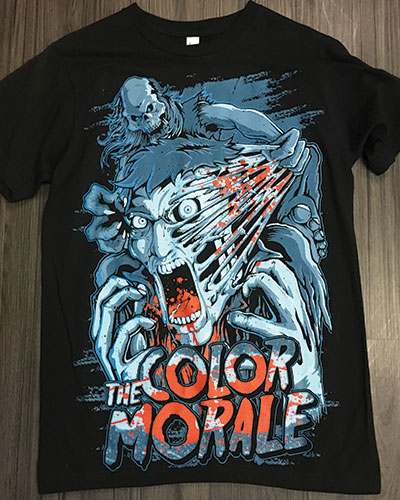
Redwall Prints (asi/305618) in Oak Creek, WI, got its start printing shirts for bands and other entertainment clients, creating complex, detailed prints. “We’re good at printing and know what we’re doing,” says owner Jeff Meilander. “We’re able to say yes to pretty much everything.”
So, when The Color Morale, an American metalcore band from Rockford, IL, wanted “something intense” on a T-shirt, the Redwall team knew just what to do. They created an eight-color jumbo print (17” wide by 23” tall) of a demonic skeletal creature ripping the flesh off a screaming man. The print combined plastisol inks with a discharge underbase to soften the feel. “Big prints can be challenging, especially when they involve this many detailed colors and discharge,” Meilander says. “They take some extra thought to product, but we love to think big, just like our customers.”
The shop also focuses on educating customers, particularly promotional products distributors. “A lot of times customers don’t really know the techniques, or see something and don’t know what it’s called,” Meilander says. “Our customers can’t go out and sell if they don’t know what they’re selling.”
Redwall prides itself on being able to handle even the tightest of turn times. “If you can give us five business days, that’s great,” he says. If not, the shop will make the most of its ample capacity, working nights and weekends if necessary, to get the job done. “We can accommodate really tight turn times. We get a lot of new business that way, when their current printer says no, and we say yes.” –TH
Thread F/X Inc.
2016 revenue: $3 million+
Location: Nashville, TN
Pieces decorated in 2016: 600,000
Clients serviced in 2016: 100
Employees: 30
Embroidery heads: 50
Screen-printing presses: 2 automatics, 2 manual
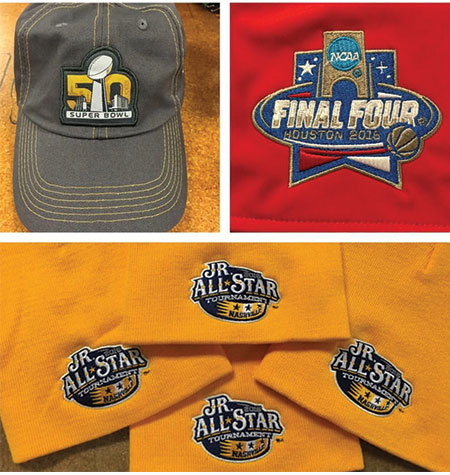
During the Southeastern Conference men’s college basketball championship last year, Thread F/X in Nashville was going through its own version of March Madness. The contract shop had a matter of hours to embroider the competing schools’ logos on the sides of SEC champion caps so they’d be ready in time for court-side presentation to the winning team.
High-visibility jobs with tight turn times are nothing new for the Thread F/X team. The shop has worked overnight embroidering thousands of hats after national college football championship games, so they’d be stocked in stores the following morning. They’ve done work for clients that hold licenses for the PGA, NASCAR, the NHL and other major sports organizations.
The key to making these types of win-contingent orders run smoothly is “all in the planning,” says Ryan Small, president of Thread F/X. “It’s making sure you’ve got pre-approved designs that run well, all approvals in place, staff secured and on-site hours beforehand, so that when the decision on whether to print comes, you’re ready.”
Small says his 19-year-old company always strives to be on the cutting-edge. “We’re probably one of the originators of the single-invoice solution in the contract decorating world,” he notes. “We handle the process from start to finish for a client, from procuring the product to drop shipping to the end-user.” For peace of mind, Thread F/X makes sure clients are able to keep track of an order’s status online.
Small is bullish about the future of the decorated-apparel industry, and believes there’s room for shops of all shapes and sizes to thrive. “If you do things the right way and take care of customers, you’ll continue to be successful.” –TH
Zome Design (Zome Inc.)
2016 revenue: $2.2 million
Location: Spokane Valley, WA
Pieces decorated in 2016: 507,105
Clients serviced in 2016: 4,768
Employees: 30
Embroidery heads: 15
Screen-printing presses: 4 automatic, 3 manual
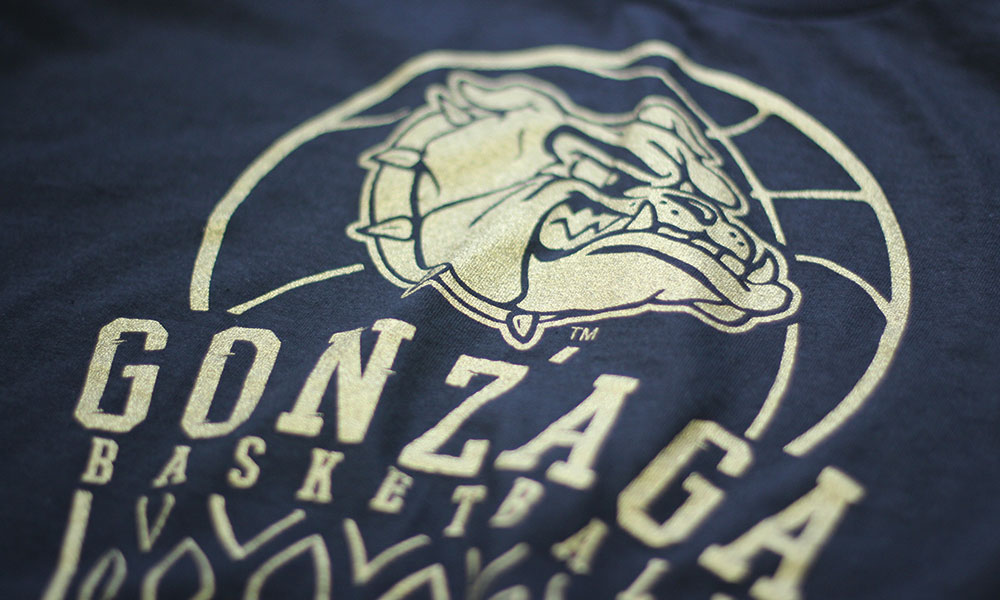
As a contract decorator for SanMar (asi/84863), Zome Design (asi/366115) has put a new spin on classic samples for all the supplier’s territory managers and catalogs. From inside-out printing with water-based inks to full-color digital heat seal decoration, Zome has incorporated cutting-edge technology into the decoration process. Experimenting with glitter vinyl, tackle twill and silicone inks, Spokane Valley’s best-kept secret has become the talk of the apparel world.
“We’re getting phone calls from outside the Spokane market, calls from overseas,” says Brayden Jessen, owner of Zome Design. “People are coming to us saying they want that new thing we posted on Instagram. They know we’re willing to push boundaries and try something new.”
Jessen learned his entrepreneurial spirit at the University of Washington, where he sold apparel to fraternities, sororities, campus groups and churches. He then became a sales representative for a larger organization, attending Greek life conferences around the U.S. But he felt the branding and marketing was antiquated – his bosses were too comfortable maintaining the status quo.
“I wanted a more youthful, aggressive approach,” Jessen says. “I’m always looking for something new because that’s how you stand out.”
As a result, Jessen launched Zome Designs in 2006, expanding his college market background to include corporate and sports apparel. Since then, Zome has focused on embroidery, screen-printing and sublimation, integrating the latest decorating methods and promotional trends.
In February, the shop had its best sales month of the year, as Gonzaga University reached No. 1 in the Associated Press’ Top 25 college basketball rankings. Zome invested $70,000 into supplies for T-shirts commemorating the occasion, and printed close to 15,000 shirts in four days. There were 14,000 different shirts in stock if Gonzaga won the NCAA National Championship, but the University of North Carolina prevented Zome from cashing in.
“Don’t get me wrong, there were a lot of losses at first,” Jessen says. “If I would have did what customers asked for instead of pitching something new, we would have made more money. But now we’ve gained a reputation for taking products to the next level.”
Zome has produced 25 orders of nearly 100 pieces for SanMar’s fall collection, which is being shown to thousands of clients across the country. “It’s not a huge moneymaker, but we’re getting experience,” Jessen says. “We’re getting many referrals, and it’s forcing us to do research and development, something that we never took the time for.” –John Corrigan
One Stop Promotions
2016 revenue: $1.2 million
Location: Birmingham, AL
Pieces decorated in 2016: 100,000+
Clients serviced in 2016: 1,000+
Employees: 9
Screen-printing presses: 2 automatic, 1 manual
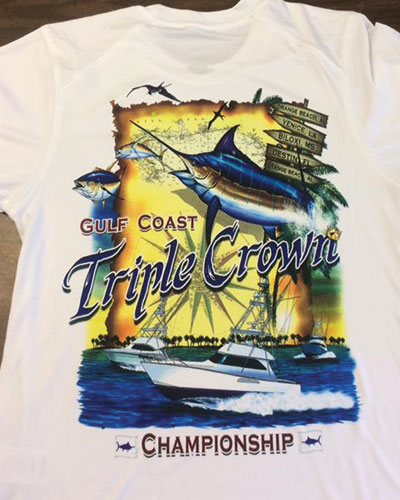
A southern Yankee for nearly 40 years, Mike Richards has grown accustomed to the easy-going way of life below the Mason-Dixon Line. Richards relocated from New York to Alabama in the late 1970s, while working for a chemical company. He dealt with a lot of screen printers as part of the gig and became so fascinated with the creative process that he launched One Stop Promotions in 1984.
While contract printing accounts for about half the shop’s business, Richards says that sports team apparel makes up 25% of sales. “We get super-busy during the back-to-school season,” Richards says. “The last quarter of the year always brings the most volume.”
His most memorable order came from outside familiar territory: the Gulf of Mexico. The organizer of the Gulf Coast Triple Crown Series, which consists of five high-profile fishing tournaments in Alabama, Louisiana, Mississippi and Florida, reached out after seeing a T-shirt produced for her daughter for a college event. Impressed with the shop’s vivid design, she asked for artwork ideas to promote the tournament.
“There are a lot of screen printers in Pensacola that really go out after that beach business,” Richards says. “They’re talented and right there, so it was a big deal for us to get this order.”
Richards had traditionally outsourced artwork for large orders, but that changed over the past year when he put a local graphic artist on the payroll. It’s a mutually beneficial partnership: The artist can do work for other shops, but Richards’ orders take priority. “He wanted something stable, and I wanted someone reliable,” Richards says.
When he envisioned his business plan decades ago, Richards didn’t intend on having more than a couple of employees. However, various circumstances caused for extra staff: increased orders, new machinery or simply a couple of folks from his church looking for work. “Those two are probably the most loyal employees I’ve got,” Richards says.
Using a four-color print process, the team designed about 300 long-sleeved, moisture-wicking T-shirts within three days. Richards says the shirts sold out during the first day of the tournament. “She even paid the invoice before the shirts landed,” Richards says. “We’d love to do business with her again.” –JC
Carolina Sash & Sew
2016 revenue: $1 million+
Location: Charleston, SC
Pieces decorated in 2016: 113,490
Clients serviced in 2016: 320
Employees: 9
Embroidery heads: 24
Screen-printing presses: 2 manual
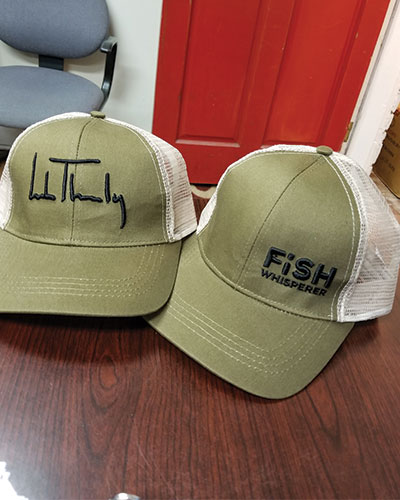
This August, hundreds of thousands of tourists poured into Charleston, SC, equipped with dark glasses and high spirits, ready to witness the solar eclipse. Grady Muns, owner of Carolina Sash & Sew, caught eclipse fever too, getting all of his employees special shades so they could watch the eclipse for the roughly minute and a half where the moon completely covered the sun. “That’s the trick, to see the totality,” Muns says. “That’s the magic of it.”
The shop also made some magic off eclipse sales, without even really trying. Muns designed commemorative T-shirts, giving them to employees and offering them to existing customers. The shirts proved so popular that Carolina Sash & Sew ended up printing 1,000, with many downtown retailers reselling them to tourists. “We don’t have an outside salesperson or anything,” Muns says. “If I’d have went out there and pushed it, I could have sold 10,000 probably.”
Carolina Sash & Sew started off as a garage-based business a quarter-century ago. “We put a two-head in the corner to make a couple of extra bucks and just grew from there.”
Muns estimates that 85% of its jobs are strictly contract work. The shop sews a lot of South Carolina logos – the iconic palmetto moon – on fleece and other outerwear. It’s also licensed to do work for several local universities, including Clemson and The Citadel. “We stay busy,” Muns says.
What makes Carolina Sash & Sew work are the numbers and the know-how. “We’re really built to do the large orders,” Muns says. But, “If you don’t have the right employees, the contract business isn’t worth it. If you’re doing $2.50 or $3 apiece, it’s all about the numbers. You’ve got to be getting 1,000 pieces out in a day.” Several of Muns employees have been with the company for over a decade and are dedicated to its success. Muns and his wife keep them motivated by offering an easygoing work culture, a fridge stocked with free lunch items, a retirement plan and performance-based bonuses. –TH